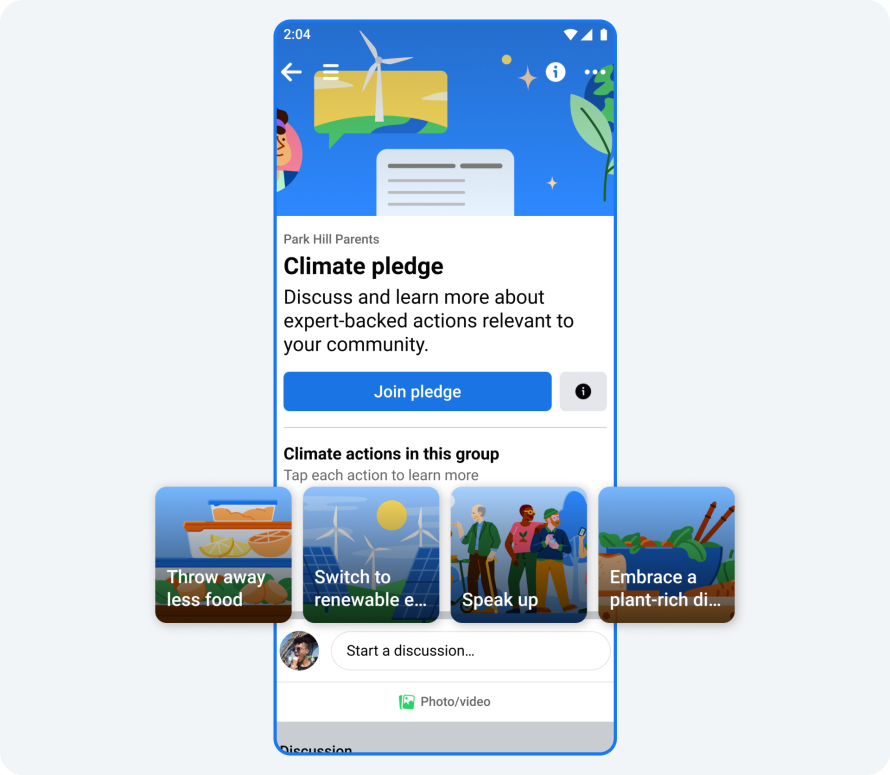If you live on the same planet as us, you’ve probably heard about climate change. If you have not, let’s introduce this phenomenon. Meta is now outlining progress on climate commitments and introducing enhanced tools to support communities take action against climate change as leaders and experts gather in Egypt for COP27.
Responsible Operations
Since 2020, after achieving net zero greenhouse gas emissions for global operations, they are now supported by 100% renewable energy. We’ve also set ambitious goals to achieve net zero value chain emissions and to restore more water than we consume in our global operations in 2030. Reducing emissions and helping suppliers to do the same is a top priority to reach the climate target.
As in prior years, our attention is on how we can use our technologies, applications, and operational strategy to show that we are dedicated to finding answers.
“This year, we announced a new partnership with Stripe, Alphabet, Shopify and McKinsey Sustainability to launch Frontier, an advanced market commitment to help scale emerging carbon removal technologies that are crucial to tackling climate change.”, wrote Meta Blog.
Increasing Credible Climate Information
Facebook has a crucial role to play in providing people with reliable information amid global emergencies, as the COVID-19 pandemic has shown. For this reason, we have developed and improved a number of technologies that disseminate reliable information about the facts of climate change.
“We’ve created a new page that explains our holistic approach to addressing climate content and misinformation on our apps. Our investment in the Climate Misinformation Grant Program is forging new partnerships and initiatives, and our Public Ad Library gives an extra layer of transparency into all climate ads.”, they mentioned.

Also Read: YouTube declares the expansion of the live-stream guest feature!
They have written about how they are working towards the changes-
- We’ve expanded the Climate Science Center and it’s now available in 165 countries. We’re also expanding Climate Inform Labels, a tool that adds links to Facebook posts about climate change and connects people with expert-backed information in the Climate Science Center.
- We’ve launched a Climate InfoFinder tool that enables people to search for trusted information about climate change and link to this content directly in comment threads.
- We worked with partners to help launch our first Climate Science Literacy Initiative. Its goal is to pre-bunk climate misinformation by running ads across our products and apps that feature five of the most common techniques used to misrepresent climate change.

Empowering Communities to Take Action
After our largest-ever global survey about climate change this past spring painted a picture of deep concern among respondents, we have seen meaningful change happen when communities come together. More than 40 million people around the world are part of at least one of the 24,000 Facebook Groups dedicated to the discovery, protection and appreciation of the earth and our environment.

Helping Equip Our Partners With Resources
They are also equipping people to partner with resources of Facebook.
“Our Boost Guide to Green Program has reached 1.3 million small and medium-sized businesses (“SMBs”) on how to become greener. We released a new report in October, in partnership with Accenture, which explores the relationship between SMBs and climate action, and how digital technology can support them. Our Data for Good program also provided data from our small business surveys to the World Trade Organization, which published a report on small businesses’ experiences and challenges related to climate change.”

They also launched the Climate Perceptions Index, developed by the Social Progress Imperative, using data from our 2022 Climate Change Opinion Survey. It offers information on the societal implications of climate change with new data on people’s awareness of climate change, their perception of its risks and their commitment to climate action.


